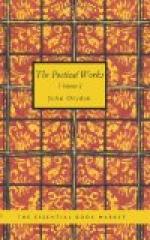How fatally this Cassandra has foretold, we know too well by sad experience: the seeds were sown in the time of Queen Elizabeth, the bloody harvest ripened in the reign of King Charles the Martyr; and, because all the sheaves could not be carried off without shedding some of the loose grains, another crop is too like to follow; nay, I fear it is unavoidable, if the conventiclers be permitted still to scatter.
A man may be suffered to quote an adversary to our religion, when he speaks truth; and it is the observation of Maimbourg, in his “History of Calvinism,” that wherever that discipline was planted and embraced, rebellion, civil war, and misery attended it. And how, indeed, should it happen otherwise? Reformation of Church and State has always been the ground of our divisions in England. While we were Papists, our holy father rid us, by pretending authority out of the Scriptures to depose princes; when we shook off his authority, the sectaries furnished themselves with the same weapons, and out of the same magazine, the Bible; so that the Scriptures, which are in themselves the greatest security of governors, as commanding express obedience to them, are now turned to their destruction; and never since the Reformation has there wanted a text of their interpreting to authorise a rebel. And it is to be noted, by the way, that the doctrines of king-killing and deposing, which have been taken up only by the worst party of the Papists, the most frontless flatterers of the pope’s authority, have been espoused, defended, and are still maintained by the whole body of nonconformists and republicans. It is but dubbing themselves the people of God, which it is the interest of their preachers to tell them they are, and their own interest to believe; and, after that, they cannot dip into the Bible, but one text or another will turn up for their purpose: if they are under persecution, as they call it, then that is a mark of their election; if they flourish, then God works miracles for their deliverance, and the saints are to possess the earth.
They may think themselves to be too roughly handled in this paper; but I, who know best how far I could have gone on this subject, must be bold to tell them they are spared: though at the same time I am not ignorant that they interpret the mildness of a writer to them, as they do the mercy of the government; in the one they think it fear, and conclude it weakness in the other. The best way for them to confute me is, as I before advised the Papists, to disclaim their principles and renounce their practices. We shall all be glad to think them true Englishmen when they obey the king, and true Protestants when they conform to the church discipline.
It remains that I acquaint the reader, that these verses were written for an ingenious young gentleman,[87] my friend, upon his translation of “The Critical History of the Old Testament,” composed by the learned Father Simon: the verses, therefore, are addressed to the translator of that work, and the style of them is, what it ought to be, epistolary.




